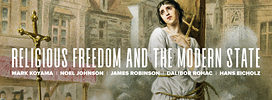Lead Essay
Religion was central to premodern states. So why isn’t it central to the story of how modernity arose? Mark Koyama and Noel D. Johnson argue that it should be. They argue that states with greater capacity — that is, stronger states — could enforce social rules that were neither personal nor based on religious identity, but that could at least potentially treat all religious believers fairly. Religion, they write, is a cheap source of legitimacy for weak states. Strong states can paradoxically offer more freedom, they argue.
Response Essays
James A. Robinson looks at how European states enjoy, or suffer from, a unique relationship to monotheistic religion. The early modern English state did not distance itself from religion as a source of state authority. Rather, it tried to make religion more tractable — while keeping the glow of its authority. Robinson extends his argument with examples from Saudi Arabia and China.
Hans Eicholz characterizes Johnson and Koyama’s theory of religious liberty as stadial — and thus as similar to theories expounded by Hegel and Marx. He finds it not so immediately objectionable, however, and he subjects it to a careful critique. He argues that it was not stateness per se that caused toleration to emerge, but rather competition among states, and among the institutions of state power, that brought them to seek the tangible advantages of legal toleration.
Dalibor Rohac agrees with the claim that stronger states and more effective protections of individual liberty tend to be found together. While state capacity can often be used for evil, the lack of state capacity is not the option to choose in preference to it. Rather we should understand federalism as an important missing piece of the puzzle because it gives individuals multiple levels of authority to resort to in the pursuit of justice.
Coming Up
Conversation through the end of the month.
Related at Cato
Cato Unbound: ”How the World Got Modern,” November 2009
Book Forum: Why Nations Fail: The Origins of Power, Prosperity, and Poverty, April 4, 2012

